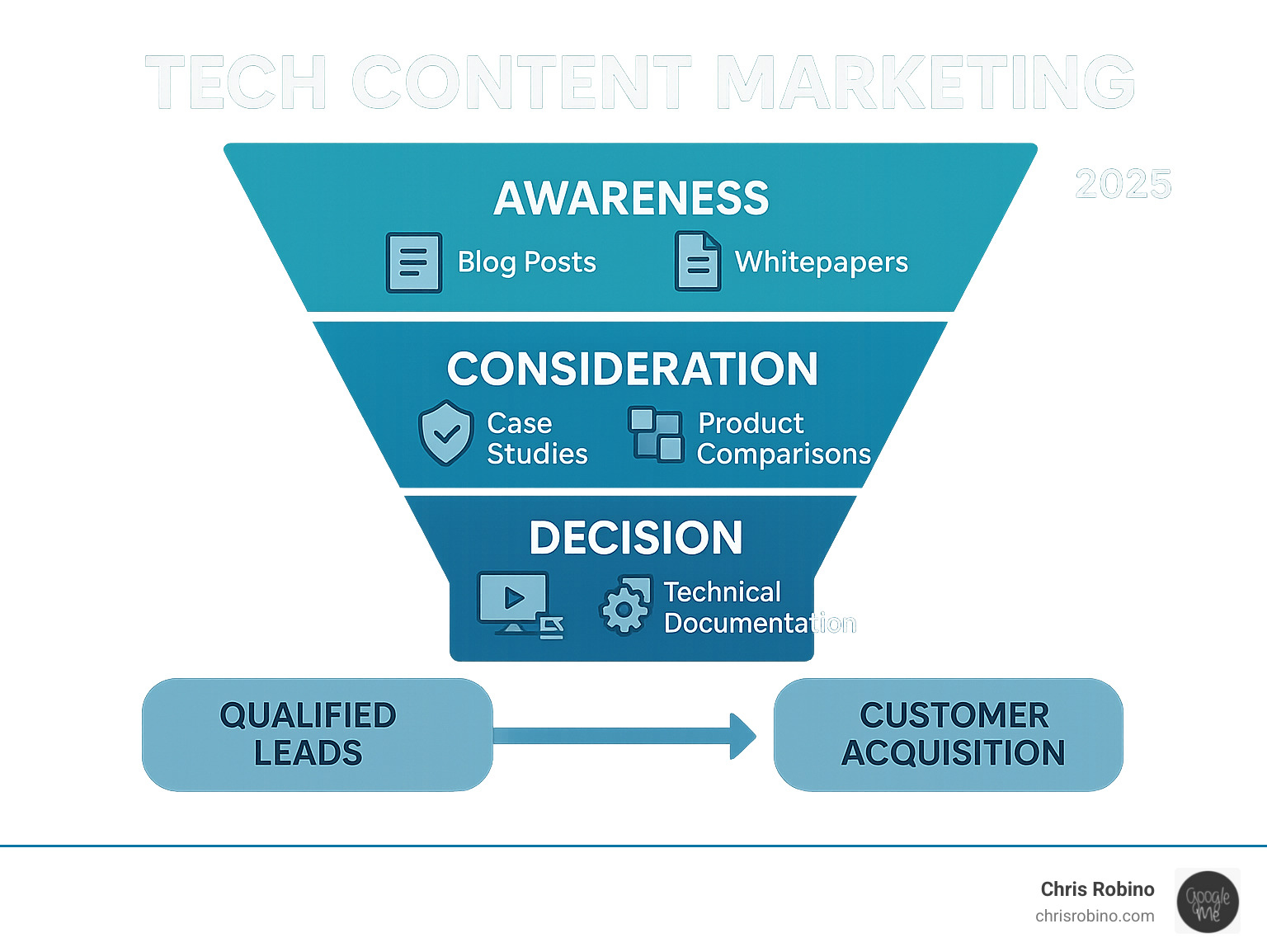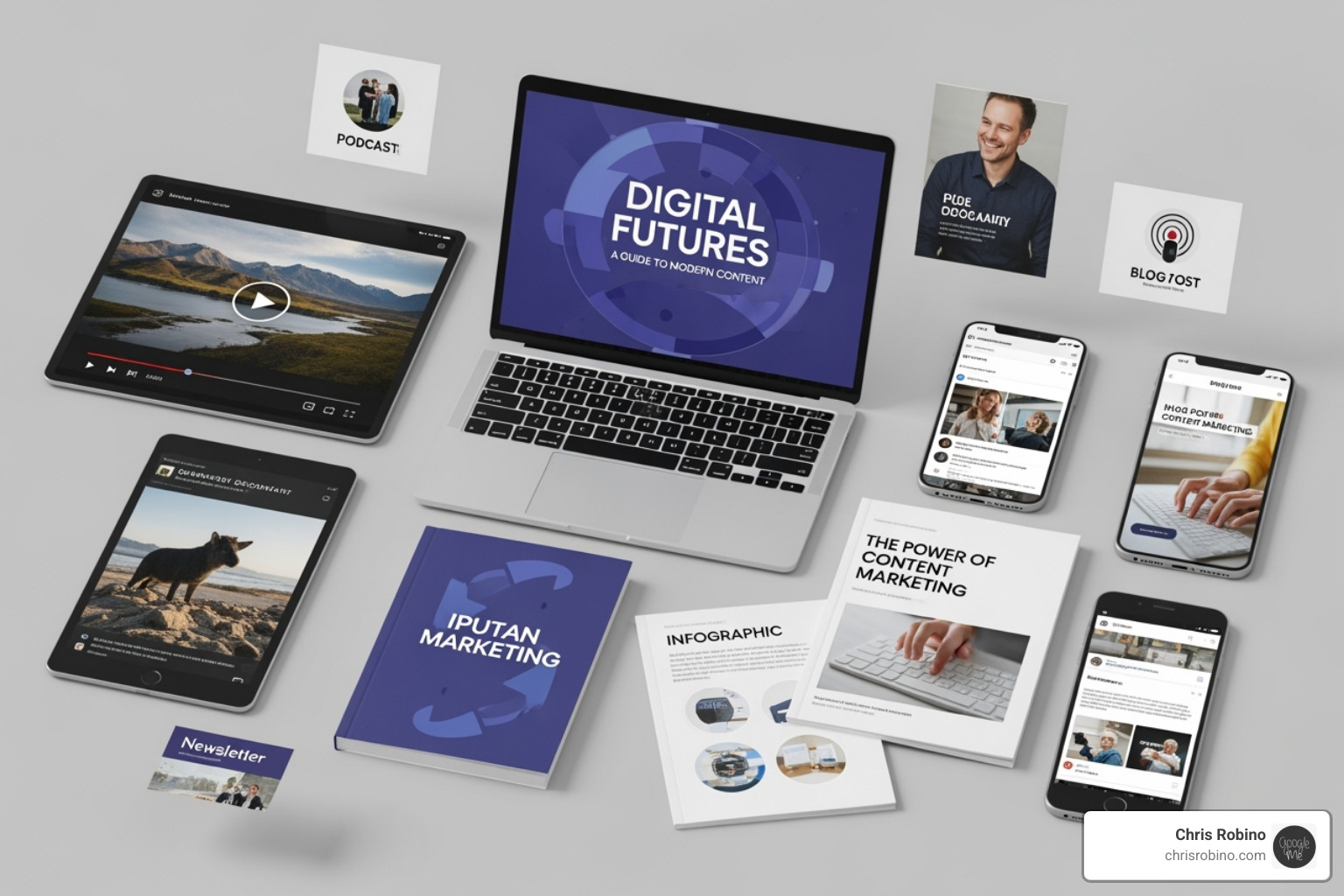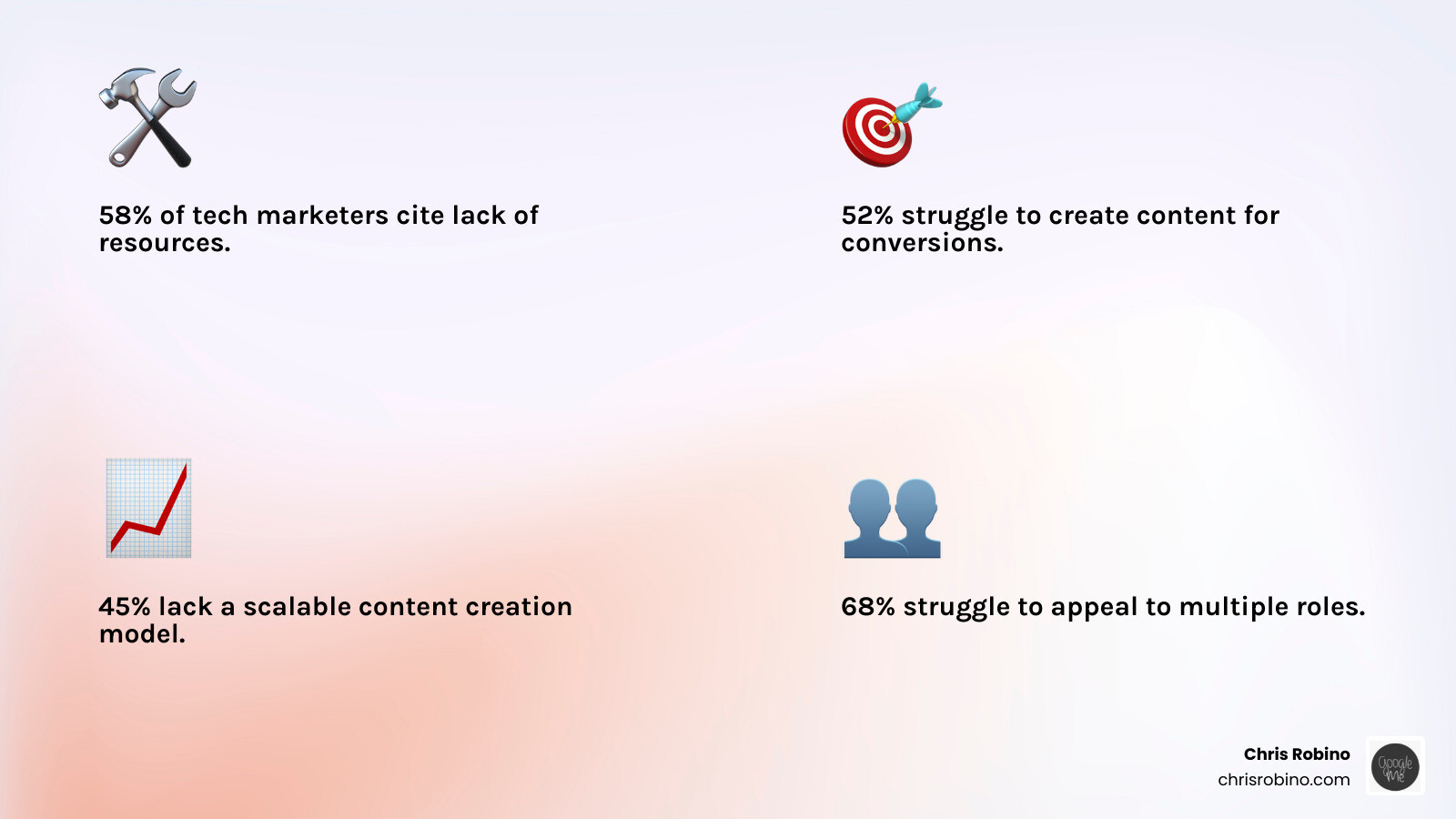Why Tech Content Marketing Is Critical for Digital Growth
Tech content marketing is a strategic approach to creating and distributing valuable, educational content that addresses the unique challenges of technical audiences. Unlike general marketing, it prioritizes problem-solving and expertise over sales messages, building trust with a skeptical audience. This specialized strategy requires deep subject matter knowledge and technical accuracy to resonate with developers, engineers, and IT professionals.
The technology industry’s complexity and longer buying cycles demand a different approach. Technical audiences don’t want to be sold to; they want to be educated. Research shows that 84% of IT buyers expect vendors to provide educational content, creating a massive opportunity for businesses that deliver it. Companies that accept targeted tech content marketing can see a 67% increase in qualified leads and 3x higher organic traffic.
I’m Chris Robino, a Digital Strategy Leader and AI & Search Expert. With over two decades of experience, I help tech companies develop content strategies that resonate with technical audiences, drive measurable growth, and deliver real ROI.

The Foundation: Understanding Technical Content Marketing
In the tech world, a great product isn’t enough. You must communicate its value to a highly knowledgeable audience, and that’s where tech content marketing excels. It’s a specialized discipline focused on creating valuable, relevant content to attract and retain a technical audience.
Defining Tech Content Marketing vs. General Content Marketing
Tech content marketing differs from general marketing by assuming a baseline of reader knowledge. It dives deep into complex topics for an audience of developers, engineers, and IT leaders. The core tenets are:
- Technical Accuracy: One error in a code snippet or technical concept can destroy credibility.
- Problem-Solving Focus: Technical professionals seek actionable solutions to specific challenges, not marketing fluff.
- Educational Goal: The primary objective is to teach and inform. Trust, and eventually business, is built by consistently helping your audience solve problems.
Identifying Your Technical Audience and Their Needs
Understanding your audience is critical. You must speak their language and address their specific pain points. Key audience segments include:
- Developers and Engineers: This hands-on group seeks practical tutorials, code examples, and deep technical guides.
- IT Decision-Makers: Managers and architects focus on the bigger picture: integration, scalability, security, and business value.
- C-Suite Executives: Leaders with technical backgrounds need content that connects technical capabilities to business outcomes and ROI.
Creating detailed buyer personas for each group is essential for success. As we explore in our Digital Strategy Advice, technical buyers expect to research thoroughly on their own before engaging with sales, making your content’s role even more critical.
The Business Case: Key Benefits for Technology Companies
Investing in tech content marketing delivers tangible business results beyond simple brand awareness. It establishes your company as a thought leader by demonstrating, not just claiming, expertise. This builds a credible brand that technical professionals trust. The key benefits include:
- Lead Generation: Content marketing generates over three times as many leads as traditional outbound methods at a lower cost.
- Sales Process Support: Your content can answer common questions and explain complex concepts, empowering your sales team.
- SEO Improvement: Publishing content optimized for technical keywords drives organic traffic. Our guide on Search Engine Rankings covers how companies can see 3x higher organic traffic.
- Customer Loyalty: Providing ongoing value beyond the sale builds trust and encourages repeat business, which is vital for earning customer loyalty.
Building a Winning Tech Content Marketing Strategy
A successful tech content marketing strategy requires careful planning, the right content formats, and effective distribution. It’s about creating content that not only gets noticed but also drives business results.
Effective Content Types for Tech Content Marketing

Technical audiences consume information in various ways. A strategic mix of formats ensures you meet their needs at every stage of their journey. Key formats include:
- Whitepapers and E-books: Ideal for thought leadership and lead generation, these formats allow for deep dives into complex topics.
- Case Studies: Provide concrete, real-world proof that your solution works. 46% of B2B buyers prefer case studies during the evaluation stage.
- Technical Blog Posts: The backbone of your strategy, these posts establish authority and improve search rankings with tutorials and industry insights.
- Webinars: Offer interactive learning and have an impressive 55% conversion rate. They are perfect for demonstrating complex concepts and building personal connections.
- How-to Guides and Tutorials: Provide immediate, actionable value that builds trust and positions you as a reliable resource.
- Product Demos and Videos: Crucial for visual learners, these formats make complex technology understandable and show your solution in action.
As a SaaS Content Marketing Consultant, I’ve seen how a strategic mix of these formats creates a powerful content ecosystem.
Strategies for Creating and Distributing High-Impact Content
Great content requires a combination of expertise and strategy. The most successful programs are built on proven principles.
- Leverage Expertise: Use Subject Matter Experts (SMEs) and technical writers who possess the authority and communication skills your audience demands.
- Plan Your Work: A documented content calendar is a hallmark of top performers. It ensures consistency and strategic alignment.
- Prioritize Quality: Technical audiences prefer one deeply researched, insightful article over ten generic ones. Focus on providing unique value.
- Optimize for Technical SEO: Go beyond basic Search Engine Optimization and target the specific, high-intent keywords your technical audience uses.
- Distribute Strategically: Use a multi-channel approach. LinkedIn is a dominant platform for B2B tech, while email newsletters nurture leads directly. Paid promotion can accelerate reach for competitive keywords.
- Repurpose Content: Maximize your investment by turning a single high-quality piece, like a whitepaper, into blog posts, infographics, and social media content.
Measuring Success and Leveraging AI Responsibly
Creating great tech content marketing is only half the battle; you also have to prove its business value. This involves tracking the right metrics and using modern tools like AI responsibly.
Measuring Success and ROI
Many technology marketers struggle to measure content results, particularly when it comes to attributing ROI. To overcome this, focus on business outcomes rather than vanity metrics.
- Lead Quality and Conversion Rates: Track qualified leads from content downloads and demo requests. Monitor how effectively different content types convert prospects.
- Sales Pipeline Influence: Use attribution tools to see which content pieces prospects engaged with before becoming customers. This directly demonstrates ROI.
- Website Engagement: Metrics like session duration and pages per visit indicate how sticky and valuable your content is to your audience.
Overcoming Common Challenges
Tech content marketers often face challenges like limited resources, difficulty scaling content production, and appealing to multiple technical roles simultaneously. The solutions lie in a strategic approach:
- Audit and Differentiate: Regularly review your content to ensure it offers a unique perspective, rather than repeating generic industry advice.
- Map Content to the Customer Journey: Create specific content for different roles (e.g., developer, CTO) at each stage of their decision-making process.
- Focus on High-Impact Activities: Delegate or automate mundane tasks to free up your team for strategic work like deep research and creative storytelling.

Leveraging AI Effectively and Responsibly
AI has transformed content marketing, with 87% of technology marketers now using generative AI tools. The key is to use AI as a powerful assistant, not a replacement for human expertise.

Use AI for ideation, research, and optimizing drafts, but always maintain rigorous human oversight. Your subject matter experts are irreplaceable for ensuring technical accuracy, authority, and the authentic voice that builds trust. Establish clear AI usage guidelines to maintain quality and ethical standards. The goal is to use AI to improve value, not just increase volume.
For more on building strategies that drive results, explore our New Tech Media Strategies Guide.
Conclusion
The journey through tech content marketing reveals a core truth: success comes from earning trust through genuine expertise. It’s about respecting your audience’s intelligence by providing the depth, accuracy, and practical insights they need to solve real problems.
The benefits are clear. When you establish thought leadership, you create a magnetic force that draws qualified prospects to you, leading to significant increases in leads and organic traffic. This is the result of consistently delivering value.
The human element remains the cornerstone of this strategy. While AI can assist with optimization, the authenticity and nuanced understanding of technical writers and subject matter experts are irreplaceable. They are the foundation of content that truly resonates.
Challenges like resource constraints and proving ROI are real, but surmountable with a strategic approach. By viewing content not as a cost but as an investment in building relationships, you position your organization for long-term success. Your expertise matters; tech content marketing ensures the right people find it at the right time.
